Celebrating Earth Day feels fraught. Increasingly alarming reports by the United Nations about the estimated one million species threatened with extinction and the need for immediate and profound emissions reductions to limit global warming fill us with dread.
The climate emergency is upon us, yet so much more needs to be done. It can feel overwhelming.
But we still must celebrate — and fight for — what we still have. If we all raise our voices, perhaps governments, institutions and corporations will finally hear us. The last stanza of “Tsunami Chant” by Wang Ping from the anthology Downstream: Reimagining Water, puts it succinctly:
All I have is a broken voice,
A heart immense with sorrow.
But please, please take them,
Let them be part of this tsunami
Of chanting, this chant of awakening.
Poetry can serve as a form of chant to recognize the fundamental worth of our environment, and acknowledge the intricate connections between myriad species and our biosphere — the forests, the air, the oceans, waterways and watersheds.
Many poets have written about the climate crisis through verse, such as the beloved and well-known activist, Rita Wong, who is an associate professor in critical and cultural studies at Emily Carr University of Art and Design. Her recent poetry collection, Current, Climate: The Poetry of Rita Wong, edited by Nicholas Bradley, represents two decades of Wong’s poems on the themes of climate justice and water. The Quill & Quire published an excellent interview with Wong that surveys both her writing and activism.
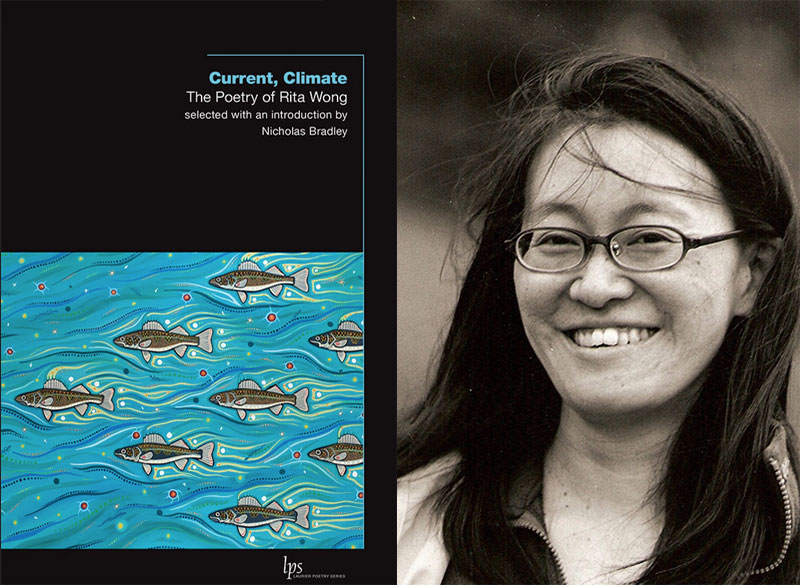
Last year, Yukon poet Joanna Lilley won the prestigious Canadian Authors Association Fred Kerner Book Award for her poetry collection, Endlings, which elegizes individual species that have become extinct, from birds and insects like the passenger pigeon and Xerces blue butterfly to mammals like the western black rhinoceros and bowhead whale.
A few of the poems also take on a broader look at how humans can respond to the reality of extinction, such as the last poem of her book. Lilley noted that the poem evolved out of wonder for other creatures:
“When I wrote 'It’s Time to Talk of Hope’ it came from that experience of delight and joy at discovering how remarkable our fellow species are. Our attention to that remarkability might urge us to try harder to slow down the sixth mass extinction event that we're sadly causing, and that greater awareness of non-human animals may in turn help us with our own evolution."
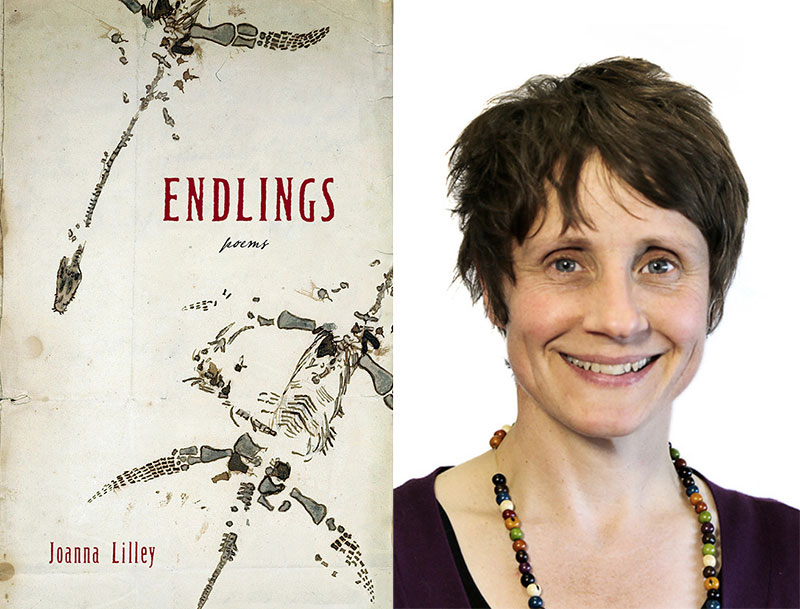
It’s Time to Talk of Hope
by Joanna Lilley
It’s time to talk of human evolution,
with a tapered blue mug
of Earl Grey and a slice of spelt
toast, while my dog rests her head
on your feet, and your dog lies behind
me watching through the window
for a yellow car. Sapiens are still
becoming, we agree, evolution
never stops, of course, as long as Moon
and Earth twist in locked rotation
around an ending sun. Perhaps
we can delay our inevitable extinction
by persuading our DNA into a kinder
transmutation, Perhaps we can augment
our aptitude for wonder. In a single solar orbit,
we discovered the existence of another
eighteen thousand species. A Tinkerbell
fairyfly fits four times inside a millimetre.
A koala's fingerprints are the same as ours.
A starfish, losing an arm, will grow another.
Let us practise our amazement in case
it saves us. Let us bend to count a slug’s
four noses, instead of drowning it
in a plastic pot of beer.
Victoria’s former poet laureate, Yvonne Blomer has just published a new collection of her poetry, The Last Show on Earth, exploring death, disability and the fate of our planet. Some of the poems are written in response to paintings by Robert Bateman, such as the piece below that relates to his painting, Long Light — Polar Bear. Commenting on the inspiration for the poem, Blomer noted, “This bear looked so much like a guy leaning against a bar on an icy stool, and so I pulled in images of a bar and what you would eat at the bar… polar bears eating in climate change.”
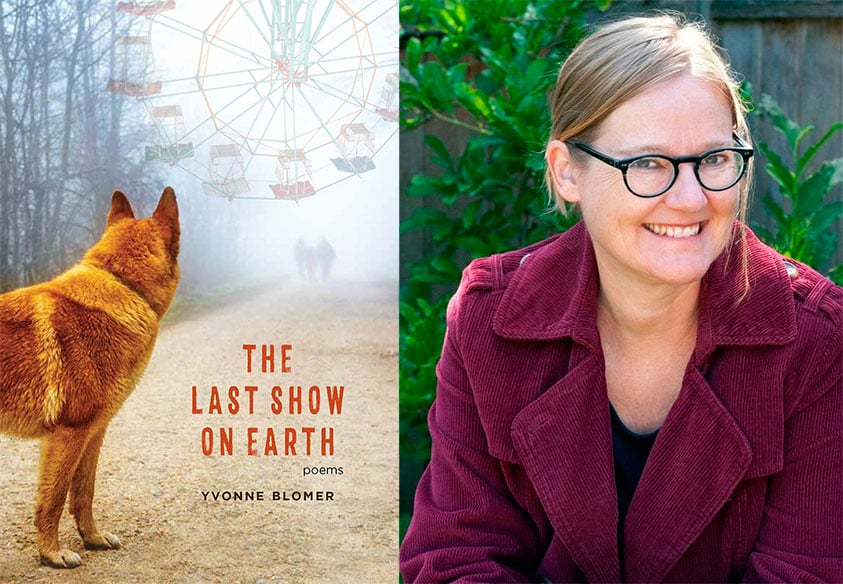
Barfly
by Yvonne Blomer
Brawny one, you lean
like some bloke at the bar, nose
lifted to catch the scent
of a bearded seal breathing
a mile offshore.
Maritime bear —
your moans and chuffs blubber-
breath; padded paws hold
you to ice. Ice the hard stool
you balance on.
Air swigger, you whiff bourbon
in spilled motor oil
along the Arctic shore,
a sweetness you cannot
resist.
Styrofoam crisps, plastic Twizzlers, rust
from a car battery at the local
dump. This want could kill you,
you short-eared giant, you hunky
boar, you statue
carved from melt and salt.
What will you binge on
when winter does not come?
Light is elemental as fur,
you yellowing ice floe.
Sun will melt you.
Yvonne Blomer has also edited two wonderful anthologies on the theme of water, Refugium: Poems for the Pacific and Sweet Water: Poems for the Watersheds, which contain a rich and diverse array of poems by poets from both B.C. and across the country.
I interviewed Blomer and three other editors of environmentally themed anthologies for a panel for the Word Vancouver Festival last fall where they discussed how they assembled their anthologies and then read examples of contributors’ work.
Filmmaker and University of Victoria screenwriting professor Kathryn Mockler co-ordinated a powerhouse editorial collective to gather poetry and prose for the anthology, Watch Your Head: Writers & Artists Respond to the Climate Crisis. There are pieces by award-winning poets such as Jordan Abel, Kaie Kellough, Stephen Collis, Erín Moure, and many others. It also has an ever evolving online companion anthology.
Professor at York University’s faculty of environmental studies, Catriona Sandilands edited Rising Tides: Reflections for Climate Changing Times, a collection of short fiction, creative non-fiction, memoir and poetry addressing the past, present and future of climate change. You can hear recordings of some of the contributors reading from their work in the anthology, such as Tzeporah Berman, Carleigh Baker, Sonnet L’Abbé, Hiromi Goto and Rita Wong on the Storying Climate Change website.
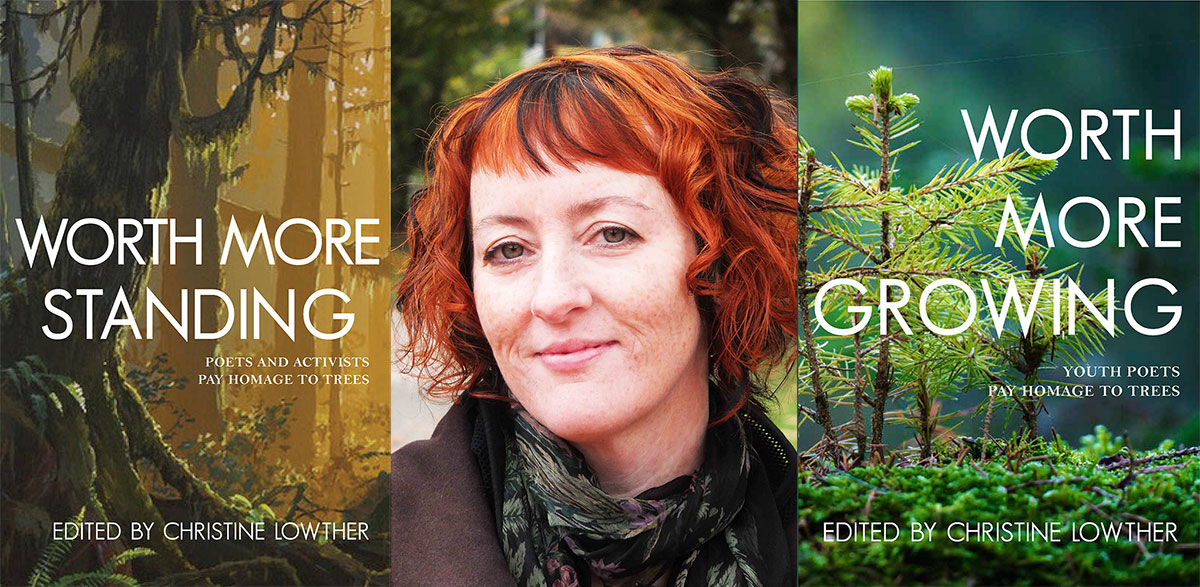
Tofino poet laureate and activist, Christine Lowther, has edited two tree-themed anthologies, one with adult contributors coming out this month, Worth More Standing: Poets and Activists Pay Homage to Trees, and a second containing student contributions from kindergarten to Grade 12 that is coming out this fall, Worth More Growing: Youth Poets Pay Homage to Trees.
Lowther received thousands of poems after posting the call for submissions. Clearly there’s an enduring and widespread love for our forests.
I’ll conclude with two celebratory poems from Worth More Standing that show the profound connection between human and forest.
The first, by Calvin Wharton, former chair of creative writing at Douglas College, takes readers on a walk through the trees, translating the process of photosynthesis into poetry.
“Having the good fortune to live in a home that is backed onto forest, I often feel as if trees are my neighbours,” he remarks. “This poem is an attempt to address the undeniable presence they call to mind when I’m among them.”
Tree Light Dialect
by Calvin Wharton
If you sit here
you might see
how trees transform light
how light changes trees
if you walk a path
of stippled space between
cedar hemlock Douglas fir
you may feel light
your thoughts rising
into a canopy of green
where they settle
in the mist hanging there
after rainfall
how those living branches
maple cottonwood western birch
draw the light
make intricate patterns
to shape an arboreal lexicon
you might notice
a kind of thirst
and want to drink down
every word of that language—all
that brilliant dialect.
Finally, here is an elegant and lyric poem by the editor’s mother, renowned West Coast poet Pat Lowther, which uses the resonant last lines of the poem, “Resurrection” by Margaret Atwood as both epigraph and title.
'At the last judgement we shall all be trees' — Margaret Atwood
by Pat Lowther
Trees are
in their roots and branches,
their intricacies,
what we are
ambassadors between the land
and high air
setting a breathing shape
against the sky
as you and I do
the spring also breaks blossoms
like bread
into our hands
as the tree works
light into bread
its thousands of tongues
tasting the weather
as we taste the electric
weather of each other
Trees moving against the air
diagram what is
most alive in us
like breath misting and clearing
on a mirror
we mutually breathe
There is no shortage of wonderful and powerful poetry on environmental themes to inspire (or provoke) both reflection and action. May this Earth Day affirm our conviction and commitment to defend and protect our precious planet. ![]()
Read more: Media, Environment


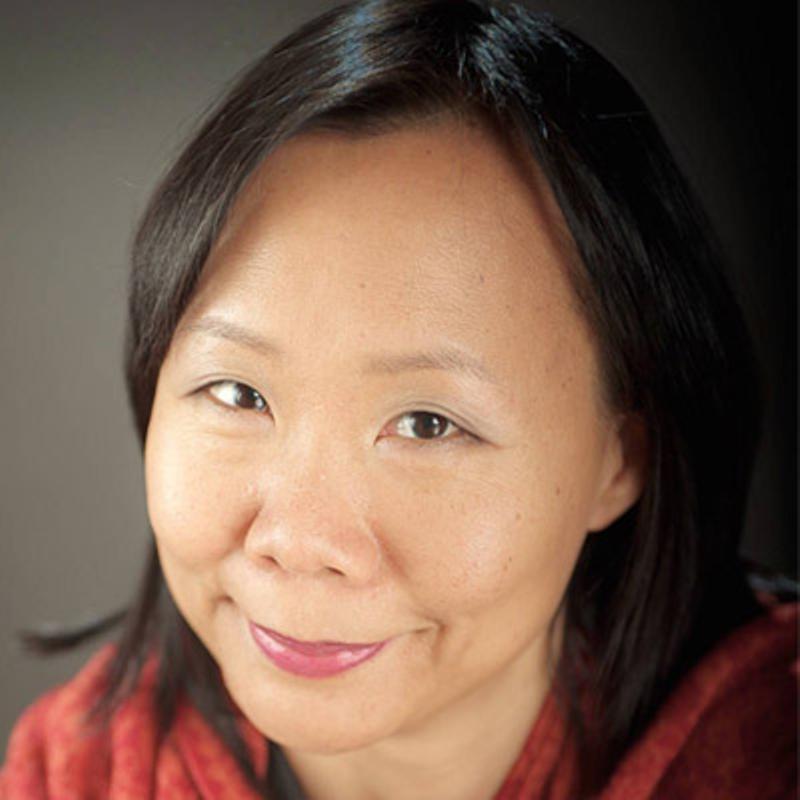
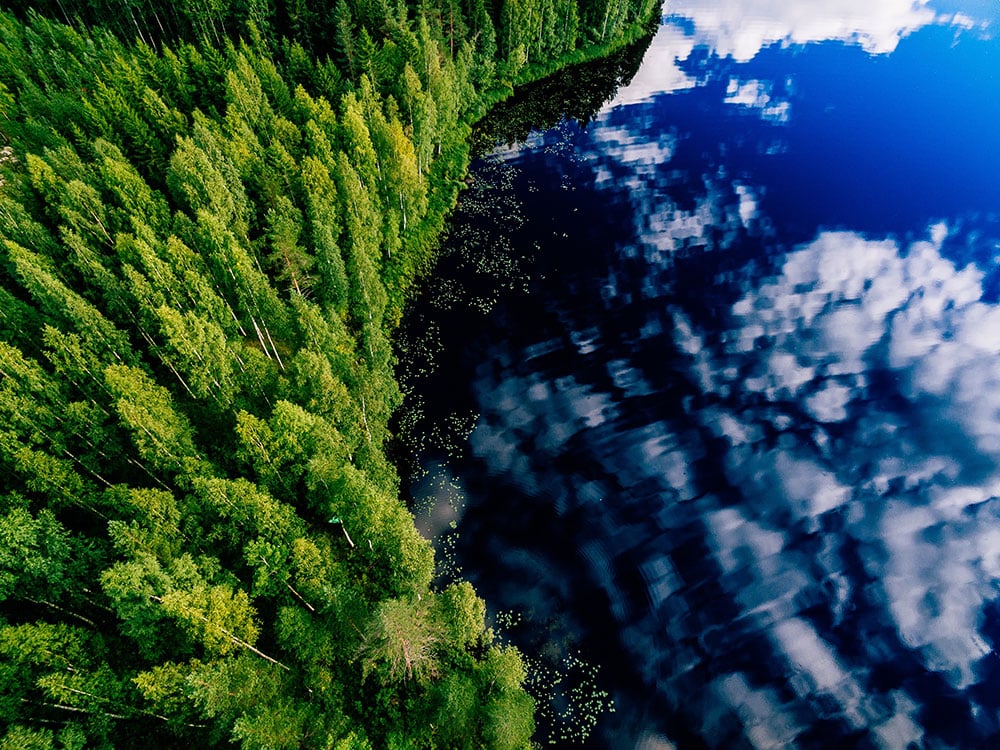












Tyee Commenting Guidelines
Comments that violate guidelines risk being deleted, and violations may result in a temporary or permanent user ban. Maintain the spirit of good conversation to stay in the discussion.
*Please note The Tyee is not a forum for spreading misinformation about COVID-19, denying its existence or minimizing its risk to public health.
Do:
Do not: